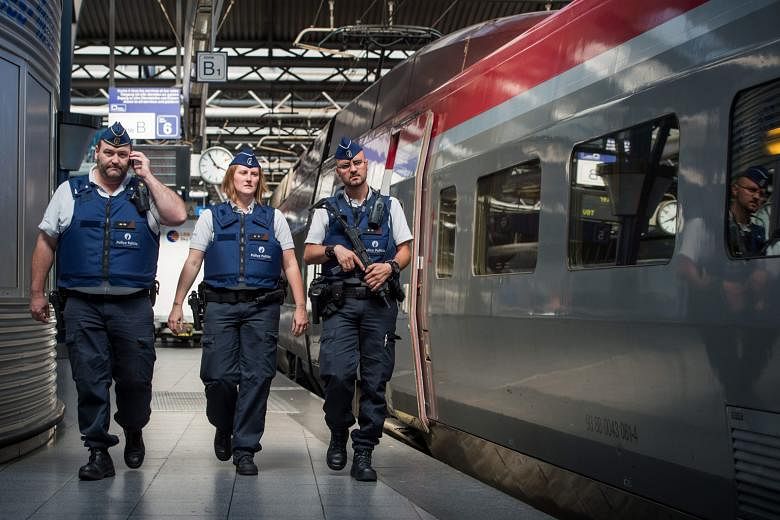France is considering stepping up security measures after a foiled terrorist attack on a high-speed train travelling from Amsterdam to Paris last week.
Interior and transport ministers from European Union countries are due to hold talks in Paris on Saturday. The meeting "will... look at very concrete proposals", French Interior Minister Bernard Cazeneuve said yesterday after a Moroccan gunman was charged over last Friday's attack.
Patrols of railway stations by police and army officers have since been reinforced while national rail company SNCF said it will increase random checks of passengers and luggage on trains. From Sept 1, SNCF will also introduce an emergency hotline for passengers to report any suspicious activity.
Security experts, however, said more security checks would lead to delays and higher ticket prices.
Protecting train travel is hard because of the sheer number of passengers involved. SNCF head Guillaume Pepy said 100 million people travel on its high-speed train service per year, using 230 stations of the 3,000 in the country.
The labour union of security staff, the SCSI-CFDT, agrees that rail security needs to be reviewed, but cautions that it cannot be as stringent as measures at airports.
Every day, more than 700,000 people use Paris' Gare du Nord station - the main hub for trains going north - while 175,000 passengers use France's largest international airport, Charles de Gaulle.
"Due to the costs of the investments related to the huge numbers of passengers, it will be impossible to get to the same level as that of airline companies," the union said.
The police union Alliance has proposed allowing off-duty officers to use public transport for free so they could keep an eye out, and also reiterated a call for them to be allowed to carry guns.
Last week's train attack has heightened tension in a country that is already at its highest security level after a massacre in January at the offices of Charlie Hebdo, a satirical weekly publication.
About 7,000 soldiers patrol busy public areas and 30,000 police guard 5,000 sensitive sites after security laws were tightened earlier this year. Security forces have been given more freedom to monitor and pursue potential perpetrators.
The suspect in the Thalys attack, a 25-year-old Morocco-born man, had been on the watchlist of various European security services. Nevertheless, he was able to board an international train with a rifle and several rounds of ammunition.
Several politicians, including Ms Marion Marechal Le Pen of the National Front, have expressed anger, saying the new security laws have proved to be ineffective.
Mr Eric Ciotti, a parliamentarian for the Republicans, suggested on Tuesday that people suspected of preparing terrorist attacks should be put in special detention centres, leaving it to the security services to decide who should be detained.
French security services are keeping a few thousand people under surveillance for possible links to organised Islamist terrorism.
In January, 12 people were shot dead at the offices of Charlie Hebdo, which had angered Muslims for publishing cartoons of the Prophet Muhammad.
Days later, an Islamist gunman killed four Jewish shoppers at a kosher supermarket and kept many more as hostages before being shot dead by police.
Mr Cazeneuve, meanwhile, has said security forces have prevented several other terrorist acts in the country since then.
But fears over security have hit tourism in France, one of the world's most visited countries.
Research by the Paris-based international tourism consultancy MKG Hospitality shows that hotel visits in the French capital in the weeks after the January terror attacks were down between 5 and 25 per cent.
There was no immediate data on the impact of last week's incident.

